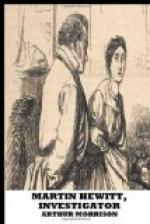The landlord looked in Hewitt’s face for a moment. Then he said: “Done! It’s a deal.”
“Very good,” Hewitt replied; “get together the one or two papers you have, and we’ll go into my business in the evening. As to Crockett, don’t say a word to anybody. I’m afraid it must get out, since they all know about it in the house, but there’s no use in making any unnecessary noise. Don’t make hedging bets or do anything that will attract notice. Now we’ll go over to the back and look at this cinder-path of yours.”
Here Steggles, who was still standing near, was struck with an idea. “How about old Taylor, at the Cop, guv’nor, eh?” he said, meaningly. “His lad’s good enough to win with Sammy out, and Taylor is backing him plenty. Think he knows any thing o’ this?”
“That’s likely,” Hewitt observed, before Kentish could reply. “Yes. Look here—suppose Steggles goes and keeps his eye on the Cop for an hour or two, in case there’s anything to be heard of? Don’t show yourself, of course.”
Kentish agreed, and the trainer went. When Hewitt and Kentish arrived at the path behind the trees, Hewitt at once began examining the ground. One or two rather large holes in the cinders were made, as the publican explained, by Crockett, in practicing getting off his mark. Behind these were several fresh tracks of spiked shoes. The tracks led up to within a couple of yards of the high fence bounding the ground, and there stopped abruptly and entirely. In the fence, a little to the right of where the tracks stopped, there was a stout door. This Hewitt tried, and found ajar.
“That’s always kept bolted,” Kentish said. “He’s gone out that way—he couldn’t have gone any other without comin’ through the house.”
“But he isn’t in the habit of making a step three yards long, is he?” Hewitt asked, pointing at the last footmark and then at the door, which was quite that distance away from it. “Besides,” he added, opening the door, “there’s no footprint here nor outside.”
The door opened on a lane, with another fence and a thick plantation of trees at the other side. Kentish looked at the footmarks, then at the door, then down the lane, and finally back toward the house. “That’s a licker!” he said.
“This is a quiet sort of lane,” was Hewitt’s next remark. “No houses in sight. Where does it lead?”
“That way it goes to the Old Kilns—disused. This way down to a turning off the Padfield and Catton road.”
Hewitt returned to the cinder-path again, and once more examined the footmarks. He traced them back over the grass toward the house. “Certainly,” he said, “he hasn’t gone back to the house. Here is the double line of tracks, side by side, from the house—Steggles’ ordinary boots with iron tips, and Crockett’s running pumps; thus they came out. Here is Steggles’ track in the opposite direction alone, made when he went back for the sweater. Crockett remained; you see




